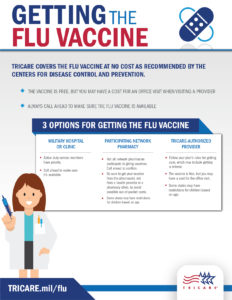By Rodney Jackson
Carl R. Darnall Army Medical Center
The flu is unpredictable, and the flu season is typically October through May every year, so Carl R. Darnall Army Medical Center prepares for the season all year long and is encouraging the community to not take this season lightly and to get the flu vaccine.
According to the health.mil website, the seasonal influenza vaccine is recommended every year for anyone six months of age and older with rare exception. People at high risk for flu complications include infants, young children, pregnant women, adults 65 and older, nursing home or long-term care facility residents, and those with underlying health conditions.
“Usually the desire for the vaccine dwindles December through January, and peeks in February,” said Maj. Claireisa Spencer, chief, public health nursing, CRDAMC. “The hospital requests vaccines for the next year in May to start planning for the upcoming flu season over the summer.”
When you have someone that chooses not to get the vaccine, all you can do is educate and help them understand that the flu is a virus, and viruses want to live, which is why we have a new vaccine every year, Spencer added.
“If they still choose not to get vaccinated, the best thing to do is get vaccinated to protect yourself,” she said.
According to the Centers for Disease and Control, for this flu season, there are three vaccines that are preferentially recommended for people 65 years and older. These are the Fluzone High-Dose Quadrivalent , the Flublok Quadrivalent recombinant and the Fluad Quadrivalent adjuvanted flu vaccines. These recommendations are based on a review of available studies which suggest that, in this age group, these vaccines are potentially more effective than the standard dose unadjuvanted flu vaccines. There is no preferential recommendation for people younger than 65 years.
The CDC website adds that asymptomatic persons can have the flu illness without showing any symptoms at all, and can infect others without knowing it.
Flu symptoms like coughs, sore throat, a runny or stuffy nose, muscle body aches, fatigue or headaches sound like the common cold, or maybe even COVID-19, added Kayla Thompson, influenza program officer, CRDAMC.
“So, it’s essential that if those symptoms do present that you stay away from others while you are experiencing those symptoms, and you go see your health care provider to get tested or treatment as needed,” Thompson said.
For most people who need only one dose of flu vaccine for the season, the CDC adds that September and October are generally good times to be vaccinated, and ideally, everyone should be vaccinated by the end of October.
Beneficiaries can get the flu vaccine at available Tricare accepted locations now.
CRDAMC provide regular updates on the availability of the vaccine here through the Sentinel and social media.
-30-








